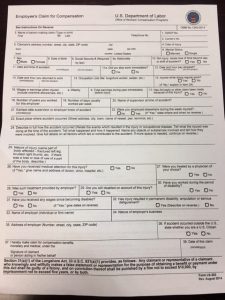Can you file a Defense Base Act Claim? How to do you file a DBA Claim in order to receive compensation?
We will give you a general explanation on how you can file a Defense Base Act (DBA) claim for Post-Traumatic Stress Disorder (PTSD) and how to receive compensation for the injuries you have suffered. Filing a DBA claim can be a long strenuous process that if not done correctly can have a significant impact on your ability to receive the proper care you deserve as well as compensation you are owed. The Federal law requires all U.S. Government contractors and subcontractors to have insurance for their employees working overseas which is designed to protect you and your ability to earn an  while working overseas for a U.S. contractor/company and which can also provide you with compensation for medical treatment. The first step in filing a Defense Base Act claim is to seek and have proof of medical treatment for any work-related injuries you may have suffered on the job. The injuries you suffered can be physical or mental health injuries or both. Generally, there is a one-year filing deadline to make a claim for benefits after the work-related injury occurred. Filing a DBA claim for PTSD can be more complicated because the symptoms may not arise until after the 1-year deadline has passed. However, PTSD is generally considered an occupational disease which can extend the filing deadline to two-years after knowing of the injury. Here is the form you can use to file your DBA claim. It is called an LS-203.
while working overseas for a U.S. contractor/company and which can also provide you with compensation for medical treatment. The first step in filing a Defense Base Act claim is to seek and have proof of medical treatment for any work-related injuries you may have suffered on the job. The injuries you suffered can be physical or mental health injuries or both. Generally, there is a one-year filing deadline to make a claim for benefits after the work-related injury occurred. Filing a DBA claim for PTSD can be more complicated because the symptoms may not arise until after the 1-year deadline has passed. However, PTSD is generally considered an occupational disease which can extend the filing deadline to two-years after knowing of the injury. Here is the form you can use to file your DBA claim. It is called an LS-203.
The importance of seeking medical treatment is both to receive proper treatment for your injury and to validate your claim and injuries with documentation. After receiving treatment, the law requires you to report your injury or injuries to your employer to put them on notice. The form required to file a claim is LS-203 which can be faxed to the Division of Longshore and Harbor Workers’ Compensation (DLHWC). When your employer receives notice of your injury, they will notify the Department of Labor which will begin the timeline of events that if not adhered to can bar your right to receive compensation for your injury. Once your claim has been assigned to the Officer of Workers’ Compensation Programs (OWCP) you will provide the required documentation, details of your injury and medical diagnosis for your right to receive compensation. The amount of compensation varies from each case’s specific facts and the Claimant’s average weekly wage which we will help you calculate. Your DBA insurance will also compensate you with weekly compensation benefits in the event you’re unable to work. We understand that PTSD is a real mental health problem that will affect your daily life, family, relationships and even your ability to earn an income. Most likely, the insurance company will outright deny your right to receive any medical care which is why it is crucial you seek proper representation. If you were in a war zone and believe you may be suffering from PTSD we urge you seek treatment immediately and to contact us so that we may preserve your rights to file a claim.
 Florida Injury Attorneys Blog
Florida Injury Attorneys Blog



 Report your accident and injuries immediately to your supervisor. Your report should be in writing and should detail ALL body parts injured in the accident. Send an email with a bcc to yourself.
Report your accident and injuries immediately to your supervisor. Your report should be in writing and should detail ALL body parts injured in the accident. Send an email with a bcc to yourself.